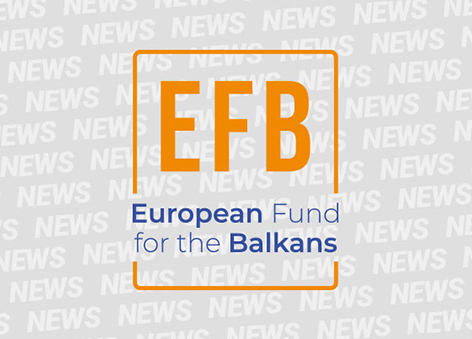
20.02.2012 All News
Follow the debates online at:
http://www.facebook.com/pages/Balkan-Peer-Exchange/273435566058913 and at www.balkanfund.org/balkanpeerexchange/2012/Schedule of online broadcast
Follow the debates online at: http://www.facebook.com/pages/Balkan-Peer-Exchange/273435566058913 and at www.balkanfund.org/balkanpeerexchange/2012/Tuesday, February 21st
(all times are in CET) 11:30 Keynote Address: Challenges and Opportunities for Think Tanks and Advocacy Organizations in the Western Balkans Today Ivan Krastev, Chair of the Board, Centre for Liberal Strategies, Bulgaria; and, Permanent Fellow, Institute for Human Studies (IWM), Austria 14:30 Thematic Panel 1: EU Integration - A Blessing and A Curse to NGOs Engaged in the Process Panelists: Milica Delević, Director, European Integration Office, Serbia Ditmir Bushati, Chairman, Parliamentary Committee on European Integration, Parliament of Albania Nives Miošić, Head of Policy Research Department, GONG, Croatia Jordi Vaquer i Fanés, Director, of CIDOB – Barcelona Center for International Affairs, Spain Moderator: Srđan Đurović, Director, Center for Applied European Studies , Serbia 16:30 Thematic Panel 2: Future Agendas and Space for Policy Advocacy in A Time of Downsized Democracy in the Western Balkans Panelists: Florian Bieber, Professor in South East European Studies, University of Graz, Austria Engjellushe Morina, Senior Policy Adviser, Kosovar Stability Initiative, Kosovo Darko Aleksov, Executive Director, Citizens' Association MOST, Macedonia Moderator: Igor Bandović, Senior Program Manager, European Fund for the Balkans, SerbiaWednesday, February 22nd
09:00 Digging Deep in the International Relations of the Region: External Actors in the Western Balkans (USA, EU, Russia, Turkey, China) Panelists: Dusan Reljić, Senior Research Associate, German Institute for International Affairs and Security (SWP), Germany Sam Greene, Director, Center for the Study of New Media & Society, New Economic School, Russia Alexandra Stiglmayer, Senior Analyst, European Stability Initiative (ESI), Belgium Zhidas Daskalovski, President, Center for Research and Policy Making, Macedonia Moderator: Fabrice De Kerchove, Project Manager, King Baudouin Foundation, Belgium 11:30 Open and Closed Data in Context, and Why it Matters in the Western Balkans Speakers: Ellen Miller, Director, Sunlight Foundation, USA (via video link) Agron Demi, Director, Institute GAP, Kosovo Vukosava Crnjanski, Center for Research, Transparency and Accountability, Serbia Suzana Dobre, Executive Director, Expert Forum, Romania Leader: Susan Treadwell, Deputy Director, Human Rights and Governance Grants Program, Open Society Foundations, Hungary The Western Balkans has witnessed the emergence of a considerable number of influential advocacy organizations and think tanks in the last two decades. Acknowledged by donors and governments alike, these two types of organizations have grown into a small, but stable and important part of civil society in their respective countries. Notwithstanding their constructive and important place, their input to policy processes needs to be improved / streamlined in light of the increasing number of overdue reforms at national levels, the stalled processes of EU integration as well as the re-surfacing of authoritarian tendencies across the region. While various donors have unequivocally supported activities of these organizations, exchange of practices and learning from peers has been sporadic and uneven across the region. Moreover, the exchanges hitherto have often been either directed by donors or were a part of a broader range of capacity building activities. Three key factors shape the context in which this event would take place: dysfunctional or broken policy processes characterized by persistently low demand by policy makers for outsiders’ analysis and independent monitoring; relatively modest capacity of these organizations and unfortunate duplication of efforts to cover all relevant topics at the national level; and convergence in the work styles and practices of think tanks and accountability organizations, a trend that has emerged in the last couple of years. This event will bring together a representative group of think tanks and advocacy organizations as well as donors to address these issues and open new avenues for future cooperation. Its organizers do not have any pre-conceived ideas to float and impose at the event. It is not our goal to spearhead establishment of any networks, regional platforms or anything similar. Likewise, while we expect participants to suggest new ideas and forge new partnerships throughout the event, the organizers do not consider the event as a direct laboratory for designing new projects that they would later underwrite. The event is jointly organized and finally supported by:






